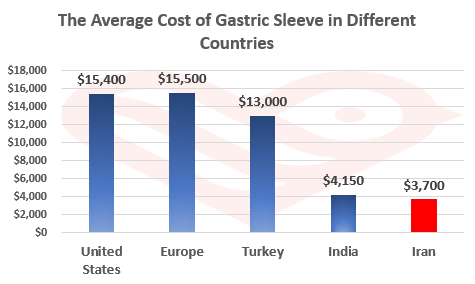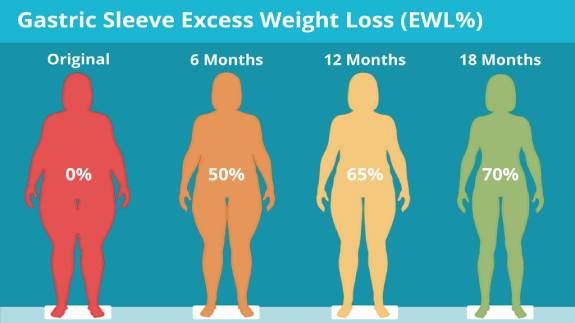Sleeve gastrectomy, also called sleeve, is a surgical procedure for weight loss. Typically, this procedure is performed through laparoscopy, in which the upper abdomen is cut and a few small tools are inserted.
During gastric sleeve surgery, about 80% of the stomach is removed, leaving a tube-like stomach with the size and shape of a banana. Limiting the size of your stomach affects the amount of food you can consume.
In addition, it causes hormonal changes that contribute to the weight loss process. These hormonal changes also help prevent obesity-related diseases such as high blood pressure or heart disease.
Diseases Associated with Obesity
undergoing gastric sleeve surgery will help you lose weight more easily than before. In addition to contributing to weight loss, it reduces the risk of developing obesity-related diseases, including:
1- Heart disease
2- Hypertension
3- High cholesterol
4- Obstructive sleep apnea
5- Type 2 diabetes
6- Stroke
7- Cancer
8- Infertility
Requirements for Gastric Sleeve Surgery
You can use this method to lose weight when exercise and proper diet do not help you lose weight. You can also use gastric sleeve surgery to lose weight if you have certain conditions, including:
1- Your Body Mass Index (BMI) is 40 or higher (severe obesity).
If your BMI is between 35 and 39.9, you are considered an obese person and more likely than anyone else to have conditions such as type 2 diabetes, hypertension or severe sleep apnea.
2- In some cases, if your BMI is 30 to 34 and you have experienced serious obesity-related problems, you may be able to go under gastric sleeve surgery under certain conditions.
3- Sometimes you need to make some permanent changes to have a new and healthy lifestyle. These changes include full monitoring of your nutrition, life, behavior, and medical condition.
What is severe sleep apnea?
As we mentioned earlier, one of the complications of obesity is severe sleep apnea, which may be unknown to some readers. Obstructive sleep apnea is a disorder that threatens you while you sleep. This disorder causes breathing to pause and resume repeatedly during sleep.
There are several types of sleep apnea. But the most common is obstructive sleep apnea. This type of apnea occurs when the throat muscles intermittently relax and block your airway during sleep.
A striking symptom of obstructive sleep apnea is snoring. Fortunately, obstructive sleep apnea treatments are available. One of which involves using a device that uses positive pressure to keep the airway open during sleep.
Another option is to pull your mandibular forward while sleeping. In some cases, surgery can also be a treatment option.
Symptoms of Sleep Apnea Disorder
Some of the symptoms of sleep apnea disorder include:
1- Excessive drowsiness during the day
2- Long snoring
3- Episodes of when you stop breathing during sleep
4- Sudden awakenings with asphyxiation
5- Waking up with dry mouth or sore throat
6- Morning headache
7- Difficulty concentrating throughout the day
8- Experiencing mood swings, such as depression or anger
9- Hypertension
10- Night sweats
11- Decreased libido
Possible Risks of Gastric Sleeve
Like all large and small medical surgeries, gastric sleeve surgery is no exception. This surgery also carries potential short-term risks. Some of the short-term risks of the disease include:
1- Excessive bleeding
2- Infection
3- Side effects of anesthesia
4- Blood clotting
5- Pulmonary or respiratory problems
6- Bleeding from the cut edge of the stomach
Long-term risks of gastric sleeve include:
1- Gastrointestinal obstruction
2- Hernia
3- Gastric reflux
4- Low blood sugar (hypoglycemia)
5- Malnutrition
6- Vomiting
Another common concern, especially when you lose a lot of weight in a short period of time, is that you may experience skin drooping. It should be noted that this is a common complication after any weight loss.
If this sagging skin annoys you, you can surgically remove it and gift yourself with a beautiful look again. Another point to consider before deciding to have gastric sleeve surgery is that unlike some other bariatric surgeries, gastric sleeve surgery is irreversible.
If you are not satisfied with the final result, you cannot return your stomach to its previous state. Rarely, the side effects of gastric sleeve surgery can be fatal.
What is a hernia?
Hernia occurs when tissue such as part of the intestine protrudes through a weak spot in the abdominal muscles. The resulting bulge can be painful, especially when coughing, bending, or lifting a heavy object.
However, many hernias are painless. Hernias are not necessarily dangerous, do not heal on their own, and can lead to life-threatening complications. Your doctor may recommend surgery for a painful or enlarged hernia.
Gastric Sleeve Preoperative Instructions
In the weeks leading up to surgery, you may need to exercise regularly and stop any tobacco use. Just before surgery, you may have restrictions on eating and drinking.
You may also have to stop taking certain medications temporarily. The best time to plan for recovery is the preoperative period. You may need the help of others after the sleeve surgery.
So it is better to inform some people around you about the process. Gastric sleeve surgery is performed in a hospital. Depending on the recovery period, hospitalization may last one to two nights.
During Gastric Sleeve Surgery
Your surgical condition depends on your individual circumstances and the actions of the hospital or doctor. Some gastric sleeve operations are performed with large traditional (open) incisions in the abdomen. But gastric sleeve is usually done via laparoscopy, which cuts the upper abdomen and inserts a few small tools into it. Before starting gastric sleeve surgery, doctors will anesthetize you.
They do this through medication that helps you experience a comfortable sleep during surgery. In gastric sleeve surgery, the surgeon creates a narrow part by removing the larger and curved part of the stomach. The total time of the operation is not more than one or two hours, and after the operation, you rest in a room and your condition is regularly checked by the hospital staff to control any possible complications.
Gastric Sleeve Postoperative Instructions
After gastric sleeve surgery, your diet should be supplemented with carbon-free fluids within the first seven days. It is then pureed for three weeks and finally changed to regular foods approximately four weeks after surgery.
You should take a multivitamin twice a day, as well as a calcium supplement once a day and a vitamin (B-12) once a month. For the first few months after gastric sleeve surgery, you should visit your physician regularly to assess your medical condition.
Some tests, such as a blood test, may be required. You may experience changes in your body’s reaction to rapid weight loss in the first three to six months after gastric sleeve surgery, including:
1- Myalgia
- Feeling as tired as when you have the flu.
3- Coldness
4- Dry skin
5- Hair loss
6- Mood swings
The Result of Gastric Sleeve Surgery
Your stomach gets significantly smaller. So the sooner you feel full and the less you eat, the less calories you get. The part of your stomach that produces ghrelin (the hormone secreted by hunger) has been removed.
So you will feel less hungry than before. Gastric sleeve surgery can cause long-term weight loss, and the rate of weight loss depends on changes in daily living habits.
It is possible to lose approximately 60% or even more of your excess weight in two years. In addition to weight loss, gastric sleeve surgery may improve or alleviate obesity-related complications, including:
1- Heart disease
2- Hypertension
3- High cholesterol
4- Obstructive sleep apnea
5- Type 2 diabetes
6- Stroke
7- Infertility
Gastric sleeve surgery can also improve your ability to perform daily activities and help improve your quality of life.
Gastric Sleeve is not effective if:
You may experience weight gain after weight loss surgery. This may occur if you do not follow the recommended lifestyle changes. For example, if you eat high-calorie foods regularly, the operation may not be beneficial and you may experience weight gain again.
To prevent weight gain, you need to make healthy and permanent changes to your diet and exercise regularly. It is important to follow your specified plan after weight loss surgery so that your doctor can monitor your progress. Visit your doctor immediately if you notice that you are not losing weight or have experienced complications after surgery.
Proper Diet of Gastric Sleeve
You will usually have to agree to certain lifestyle changes recommended by your surgeon before having gastric sleeve surgery. These changes are to help you lose weight and achieve your desired weight.
One of these changes is choosing a healthy diet for the rest of your life. Your surgeon will prescribe the best type of gastric sleeve diet before and after surgery. The changes suggested by the surgeon may be similar to the general dietary guidelines, which are described below:
Dietary Changes in Gastric Sleeve
1- Two weeks before the surgery: Increase protein, reduce carbohydrates and remove sugar from the diet.
2- Two days before and the first week after the surgery: Only consume clear liquids without caffeine and carbonate.
3- You will soon notice that you eat less than you did before the surgery, because you are quickly satiated and you do not feel hungry.
Diet for the First Week After Gastric Sleeve
- Be sure to drink plenty of transparent liquids. If you have trouble staying hydrated, talk to your doctor about low-calorie electrolyte drinks such as Gatorade.
2- Do not consume sugar. Sugar can cause dumping syndrome. A complication caused quickly by excessive sugar entering the small intestine. This leads to nausea, fatigue, diarrhea and even vomiting. Sugar is also full of calories. It should now be avoided and minimized in the long run.
- Caffeine may cause stomach acid reflux problems and dehydration. Therefore, it should be avoided.
- Fizzy drinks including sugary drinks, can all play a role in causing gas and bloating. All of these notes should be avoided after surgery and possibly even in the long run.
Diet for the Second Week after Gastric Sleeve
Your diet should include the following:
1- Suitable drinks for breakfast
2- Light broth and creamy soups
3- Unsweetened milk
4- Fat and sugar-free pudding
5- Frozen and lean yogurt
6- Plain and lean Greek yogurt
7- Fruit juice without pulp and diluted with water
8- Cereals such as wheat or oatmeal
During this period, you may feel that your appetite increases. This is perfectly normal. But solid food must still be avoided. Your body system is not yet able to digest and manage solid foods.
Diet for the Third Week after Gastric Sleeve
Your diet may include the following:
1- Chopped baby food
2- Silk tofu
3- Cooked and pureed white fish
4- Soft or mixed eggs
5- Soup
6- Canned fruit
7- Mashed banana or very ripe mango
8- Pureed or mashed avocado
9- Plain Greek yogurt
Avoid sliced and solid foods as well as caffeine during this time.
Now that it’s been a month after surgery, you can add solid foods to your diet. Sugar and fat consumption, including high-fat dairy, as well as hard-digestion foods such as steak and nuts should be avoided.
Other foods to avoid include pasta, potatoes and other high-carb foods. At this time, you can usually consume caffeine-containing beverages moderately. Foods you can add to your list include:
1- Well cooked chicken and fish
2- Well cooked vegetables
3- Sweet potatoes
4- Lean cheese
6- Fruit
7- Low sugar cereals
Pros and Cons of Gastric Sleeve Surgery
Any type of bariatric surgery has its own advantages and possible disadvantages. That’s why it’s important to share your weight loss options with your doctor to determine which solution suits you.
Advantages of Gastric Sleeve Surgery
- A smaller stomach is still functioning normally. So you can eat more foods but in less volume.
- If desired, gastric sleeve can be converted to gastric bypass (Roux-En-Y) later.
- Gastric sleeve surgery removes the upper part of the stomach that produces hunger-stimulating hormones (ghrelin), so your appetite often decreases.
4- Acid secretion is less and therefore less likely to wound.
5- Since the intestine remains intact, this surgery is less likely to cause block the intestines, anemia, osteoporosis and lack of protein and vitamins.
Disadvantages of Gastric Sleeve Surgery
1- This operation is not reversible, because part of the stomach is removed.
2- Weight loss without intestinal bypass may be more difficult.
- The body still tolerates carbohydrate-rich and high-fat foods that can slow down weight loss.
- It may not be covered by insurance companies because gastric sleeve is still a research method.
Gastric Sleeve Surgery in Iran
Gastric sleeve surgery is one of the most popular bariatric surgeries in Iran. Gastric sleeve in Iran, also known as sleeve gastrectomy, is performed by highly skilled surgeons who have completed bariatric and laparoscopic surgery board training at top universities.
According to the above, Iran can be a good option for traveling to perform gastric sleeve surgery. The cost of performing this operation in Iran is very reasonable due to its high quality.
























































